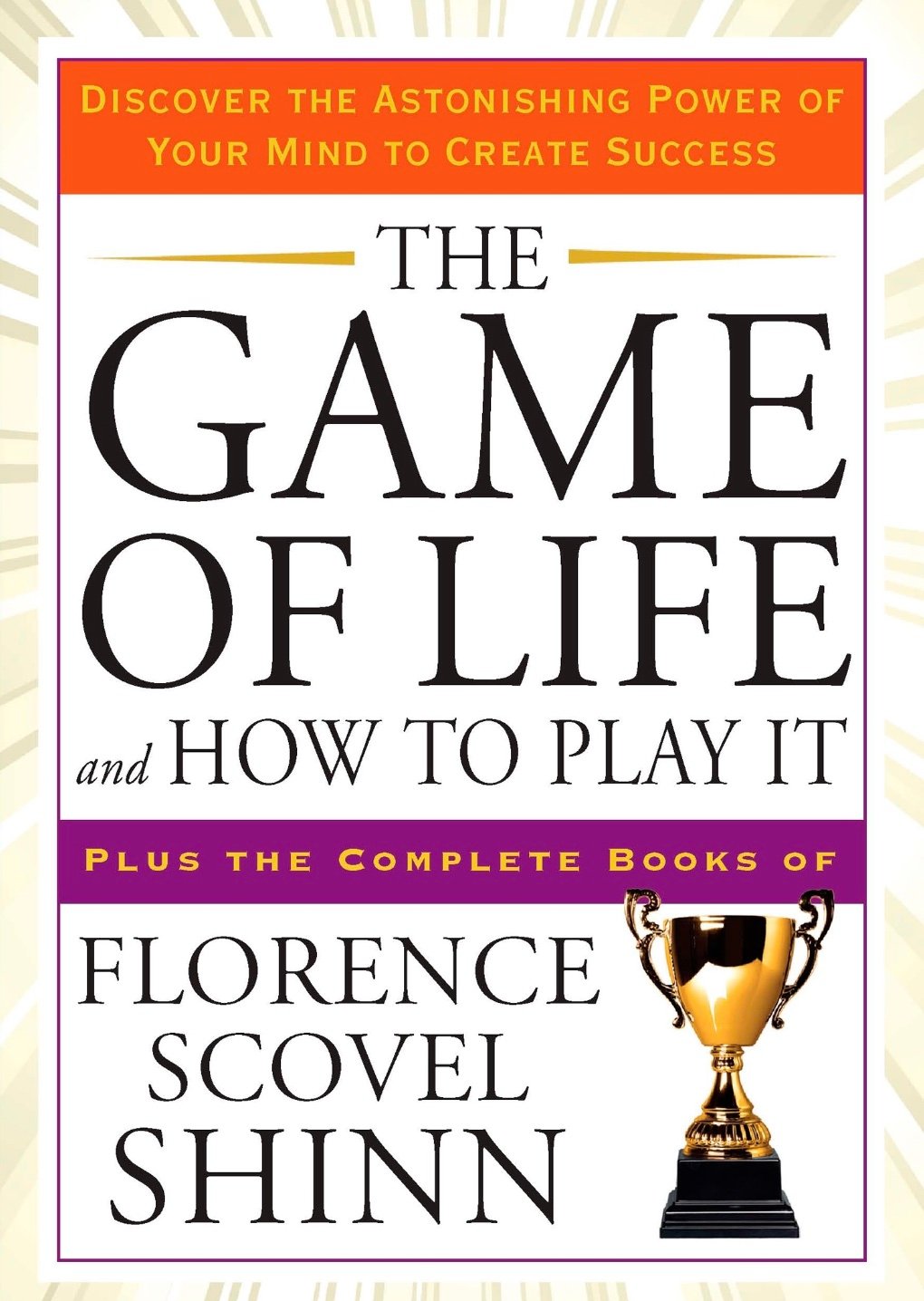Florence Scovel Shinn’s The Game of Life and How to Play It, first published in 1925, is a spiritual classic that feels like a treasure map to mastering life’s mysteries. At just under 100 pages, this compact masterpiece blends metaphysical wisdom, biblical insights, and real-life stories to reveal how our thoughts, words, and faith shape our reality. Shinn, a New Thought teacher and artist, frames life as a game with universal rules—rules anyone can learn to play by to unlock abundance, harmony, and joy. In this detailed summary, we’ll walk through each chapter, unpacking Shinn’s philosophy and its practical applications. Whether you’re a spiritual seeker or just curious, this book might just change how you roll the dice in life’s grand game. Let’s dive in!
Chapter 1: The Game
Shinn kicks off with a bold premise: life is a game, and there are spiritual laws governing how it unfolds. Drawing from New Thought principles, she asserts that we’re not victims of fate but co-creators of our destinies. The key rule? What you sow in your mind, you reap in your reality. She introduces the Law of Expectancy, explaining that whatever we vividly imagine and expect with faith tends to manifest. Fear breeds failure; trust attracts triumph. Shinn cites the Bible—“According to your faith be it unto you” (Matthew 9:29)—and shares an anecdote of a woman who, expecting a miracle, received a gift that solved her financial woes. Right away, Shinn hooks readers with the idea that life responds to our inner game plan.
Chapter 2: The Law of Prosperity
Here, Shinn zeros in on wealth—not just money, but a rich life in all senses. She argues that prosperity flows when we align with divine abundance, which she sees as our birthright. Doubt and scarcity-mindedness block the flow; faith and gratitude open it. One vivid example is a woman who affirmed, “God is my supply, and infinite riches are mine now,” only to see unexpected funds arrive shortly after. Shinn emphasizes preparation—acting as if the good is coming—like buying a coat before the money appears. It’s about trusting the universe’s infinite resources and shedding limiting beliefs about lack.
Chapter 3: The Power of the Spoken Word
Words aren’t idle chatter—they’re wands of creation, Shinn declares. This chapter explores how our spoken affirmations shape our world. Positive declarations, spoken with conviction, set good things in motion, while curses or complaints boomerang as misfortune. She tells of a man who reversed his bad luck by switching from grumbling to blessing his circumstances, soon landing a job. Shinn’s advice? Watch your mouth—literally. Affirm what you want, not what you fear. Her go-to phrase, “I cast this burden on the Christ within, and I go free,” becomes a mantra for releasing negativity and claiming power.
Chapter 4: The Law of Nonresistance
Resistance is futile—and counterproductive—Shinn warns. Fighting against problems only magnifies them. Instead, she advocates a radical surrender: bless the situation, let go, and trust the divine plan. A standout story involves a woman who stopped resenting her ex-husband, affirmed peace, and soon saw her own life bloom with new opportunities. Nonresistance doesn’t mean passivity—it’s an active choice to rise above struggle. Shinn ties this to Jesus’ teaching, “Resist not evil” (Matthew 5:39), framing it as a strategy for victory through detachment.
Chapter 5: The Law of Karma and The Law of Forgiveness
Shinn merges karma and forgiveness into a single lesson: what goes around comes around, but love can break the cycle. She explains that holding grudges ties us to negative patterns, while forgiving others (and ourselves) clears the slate. One client, bitter over a betrayal, released her anger with the affirmation, “I am at peace with myself and the world,” and soon reconciled with her foe. Shinn sees forgiveness as a boomerang of blessings—it frees us from karmic debt and invites harmony. It’s a tough but liberating rule in the game.
Chapter 6: Casting the Burden
This chapter builds on surrender, introducing the idea of “casting the burden” onto a higher power—what Shinn calls the “superconscious mind” or “Christ within.” It’s about handing over worries and trusting divine intelligence to work things out. She shares a story of a woman overwhelmed by debt who repeated, “I cast this burden on the Christ within, and I go free,” and watched solutions unfold effortlessly. Shinn frames this as a mental shift: stop wrestling with problems and let the universe handle the heavy lifting. It’s a masterclass in faith under pressure.
Chapter 7: Love
Love isn’t just an emotion—it’s a cosmic glue, Shinn asserts. This chapter explores how loving thoughts and actions align us with divine order, healing relationships and attracting good. She recounts a woman who blessed a rival instead of cursing her, only to see tensions dissolve and her own life improve. Shinn ties this to the commandment “Love thy neighbor” (Matthew 22:39), arguing that resentment repels blessings, while love magnetizes them. It’s a simple yet profound rule: play the game with an open heart.
Chapter 8: Intuition or Guidance
Shinn calls intuition our “inner compass” in life’s game—a direct line to divine wisdom. She urges readers to trust those gut feelings or “hunches from the Infinite.” One example is a man who bought a stove on a whim, later discovering it was exactly what his new home needed. Shinn believes these nudges guide us when logic alone isn’t enough. The trick is to quiet the mind and listen—intuition often whispers while doubt shouts. This chapter empowers readers to lean on their spiritual instincts.
Chapter 9: Perfect Self-Expression or The Divine Design
Everyone has a unique purpose—a “divine design”—Shinn explains, and the game is won by fulfilling it. She encourages trusting that the right opportunities (jobs, relationships, paths) will appear when we align with this inner blueprint. A woman seeking work affirmed, “I am now in my perfect place,” and landed a role tailor-made for her talents. Shinn stresses patience and faith over forcing outcomes—your role in the game is already scripted; you just need to step into it.
Chapter 10: Denials and Affirmations
The final chapter ties it all together with a crash course in mental reprogramming. Denials reject false beliefs (e.g., “There is no lack in divine mind”), while affirmations claim the good (e.g., “Infinite intelligence guides me now”). Shinn shares a case of a sick child healed after her mother denied illness and affirmed health. It’s a formula: deny the negative, affirm the positive, and watch reality shift. This chapter is Shinn’s playbook distilled—practical tools to master the game’s mental mechanics.
Strengths and Takeaways
The Game of Life shines for its clarity and optimism. Shinn transforms lofty metaphysics into everyday tools—affirmations, visualization, forgiveness—that anyone can use. Her stories, like miracles on tap, spark hope, even if they lean anecdotal. Readers leave with a mindset shift: life isn’t random; it’s a game you can win by mastering its spiritual rules. Key takeaways include speaking with purpose, trusting divine timing, and imagining success vividly.
Why It Matters Now
In today’s fast-paced and uncertain world, understanding life and how to live it is more crucial than ever. The mind is the architect of reality, and mastering it is the key to shaping a fulfilling life. Our approach is deeply influenced by timeless wisdom, from ancient teachings to quantum psychology, bridging the gap between spiritual insight and practical transformation.
Just as Florence Scovel Shinn’s work in 1925 emphasized the power of thought, faith, and spoken intention, our coaching programs guide individuals to reclaim agency over their lives—not by chance, but through conscious creation. Whether you’re seeking clarity, healing, success, or purpose, the principles remain the same: expect the best, align your words and actions, and allow transformation to unfold.
The real challenge isn’t merely knowing these truths—it’s living them. That’s why our programs go beyond theory, offering structured guidance, deep introspection, and personalized strategies to help you break free from limiting beliefs and reshape your reality. Pair your journey with commitment and self-inquiry, and you’ll find life shifting in profound ways. The game of life isn’t about waiting for miracles—it’s about learning to play it masterfully.
Final Verdict
This isn’t a book—it’s a spiritual playbook. Short, potent, and packed with wisdom, The Game of Life and How to Play It is ideal for anyone ready to rethink reality and play with purpose. Shinn’s message is timeless: life’s a game, and you’ve got the rulebook. How will you play?







